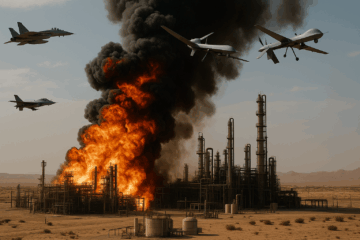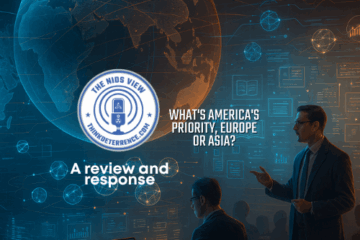The October 7, 2023, attack on Israel by Hamas and the ongoing war in Gaza, provide Iran with a unique opportunity to advance its foreign policy interests in the Middle East. With the signing of the Abraham Accords, Bahrain, Morocco, Sudan, and the United Arab Emirates normalised relations and established diplomatic ties with Israel. This was an immense achievement for Israel and the Sunni Gulf states, who share a common threat emanating from Iran’s assertive regional policies.
In March 2023 Azerbaijan finally opened its embassy in Israel, despite establishing bilateral relations in 1992. Baku opted to open its embassy in Tel Aviv after restoring its territorial integrity. The next month, in April 2023, Israel inaugurated its embassy in Ashgabat, Turkmenistan, making it the closest Israeli embassy to Iran, just 17 km from the Iranian border. Iran followed all these diplomatic moves with annoyance and concern.
Normalization of Saudi-Israeli relations was also widely discussed as an extension of the Abraham Accords. Momentum similarly grew in 2022 for Israel and Turkey to normalize their strained relations. At the next meeting between Israeli prime minister Benjamin Netanyahu and Turkish president Recep Tayyip Erdoğan, they agreed to continue developing bilateral relations and to pay official visits to each other.
Azerbaijan’s initiative to set a new trilateral format for cooperation between Azerbaijan, Israel, and Turkey was advancing rapidly in an environment of geopolitical uncertainty for Tehran. The October 7, 2023, attack on Israel gave Iran the chance to derail possible Saudi-Israeli and Turkish-Israeli ties and stop the Azerbaijani initiative for trilateral cooperation in its tracks.
Tehran seized the opportunity of the war in Gaza to pursue its grand, multidimensional strategy. It is using economic means, via a set of coercive actions, to achieve foreign policy objectives, something widely overlooked. Iran’s multidimensional strategy seeks to achieve multiple goals simultaneously, in both the Middle East and South Caucasus.
Iranian strategy prioritizes using economic means to isolate Israel by derailing its relations with Turkey, Azerbaijan, and the Gulf Arab states. Iran’s subtle, calculated, approach also intends to inflict an economic blow on Azerbaijan, Israel, and Turkey, which makes substantial revenue from the export of oil via Turkey to Israel.
Considering the global nature of the modern economy, economic power plays a significant role in shaping geopolitical outcomes and foreign policy. In this case, Iran’s usage of political, diplomatic, and media instruments, as well as its regional proxies like the Houthis in Yemen, merits analysis. The use of economic means to shape geopolitical outcomes and achieve foreign policy goals is the cornerstone of Iran’s multidimensional strategy. Iran does not possess the necessary economic means, by itself. However, the Islamic Republic does possess significant geopolitical assets in the form of proxy groups and diplomatic and media resources, which it is using to hinder or shut down global navigation and prevent the flow of strategic commodities to Israel.
The late Iranian foreign minister, Amir Abdollahian, called on Muslim-majority countries to impose an oil embargo on Israel and expel its envoys in October 2023. Iran’s Supreme Leader Ayatollah Khamenei called on Muslim countries to cease trade, particularly food and oil with Israel, the following month. Hasan Nasrallah, leader of Hezbollah, Iran’s Lebanese proxy, followed Ayatollah Khamenei’s call and appealed to Arab and Islamic countries to impose an oil embargo on Israel.
The call for an economic boycott of Israel by Muslim-majority states gives an insight into Iran’s multidimensional strategy. The late Iranian president, Ebrahim Raisi, also reiterated Ayatollah Khamenei’s call for a boycott of Israel at the Arab-Islamic Summit in Riyadh in November 2023. President Raisi argued that Islamic countries must cut diplomatic relations as well as refuse to buy Israeli goods, echoing Khamenei’s call. Weeks after his call for an economic boycott, Ayatollah Khamenei had urged Muslim countries that have diplomatic relations with Israel to halt diplomatic ties for a limited period. In January 2024 Ayatollah Khamenei repeated his call for a total blockade of Israel by Muslim countries.
The official rhetoric of Iran’s leaders clearly shows Tehran’s multidimensional strategy of using the war in Gaza to isolate Israel economically, impose an oil embargo, destroy economic and diplomatic ties between Israel and Muslim-majority countries, and position Iran as a major geopolitical force in the region. To implement this strategy Iran has employed coercive media propaganda against many countries, including Azerbaijan, Kazakhstan, and Turkey. Iranian media has intensified criticism of Turkey for its trade and economic ties with Israel and Azerbaijan for oil exports via the Baku-Tbilisi-Ceyhan pipeline, which meet 40 percent of Israel’s demand for crude oil.
Iranian media has also targeted Turkish president Erdoğan for not cutting trade relations with Israel, which was actively used within Turkey by Islamist circles including the leader of the Islamist New Welfare Party (YRP), Fatih Erbakan, in recent local elections. The New Welfare Party, which sympathizes with Iran, managed to get 6.1 percent of the nationwide vote—contributing to Erdoğan’s first election loss in decades. When Erdoğan’s ruling party suffered the election setback, he launched economic measures against Israel, halting trade. Iranian media propaganda and the active shaping of the narrative in the run-up to elections in Turkey yielded a significant result by creating strain in diplomatic and economic relations between Turkey and Israel. The multidimensional Iranian strategy of achieving goals in multiple theatres has so far succeeded in two places: Turkey and Yemen. Using the Houthis to disrupt maritime shipping, Iran positioned itself as a key player that can shut down trade not only in the Persian Gulf but also in the Bab al Mandab Strait.
Iran’s strategy of using economic means to achieve its goals also entails containing and weakening Azerbaijan by inflicting significant revenue losses. Not only does Azerbaijan meet nearly 40 percent of Israel’s demand for crude oil, Azerbaijan’s state energy giant SOCAR alongside British Petroleum and Israel’s NewMed were awarded a license to explore an area to the north of Israel’s Leviathan gas field in the Eastern Mediterranean. The strong bilateral and multifaceted relations between Israel and Azerbaijan have long been a primary concern for the Iranian establishment. The military-technical partnership between Israel and Azerbaijan helped Baku boost its national security and defense, as well as to retake control of its territory from occupying Armenian forces. Changes in the realities of South Caucasus politics since 2020 are a security concern for Tehran. Constant Iranian media attacks against the Baku-Tbilisi-Ceyhan oil pipeline are part of the multidimensional Iranian strategy.
Better understanding Iran’s strategy is important if the United States desires to counter those efforts. Iran’s use of hybrid warfare, proxies, media propaganda, and blackmail—to force neighboring countries to cut economic and diplomatic ties with Israel—is having some success but is not in the interest of the region. Iran’s primary goal is to derail the normalisation process under the Arab-Israeli Abraham Accords; to strain Turkish-Israeli diplomatic and economic ties; to damage Azerbaijan’s independence by targeting its primary source of revenue; to prevent the emergence of the Azerbaijan-Israel-Turkey trilateral cooperation; and to prevent further diplomatic normalisation of relations between Israel and Muslim-majority states. It is only through understanding Iranian efforts that the United States, Israel, and the larger region can prevent Iran’s success.
Rufat Ahmadzada is a graduate of City, University of London. His research area covers the South Caucasus and Iran. Views expressed in this article are the author’s own.




